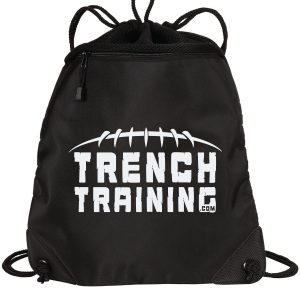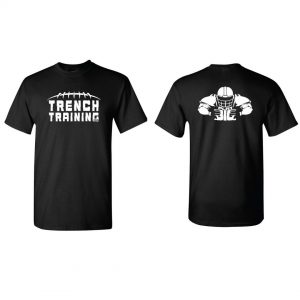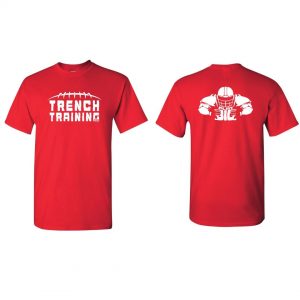
by Steve Stark | Apr 20, 2016 | Blog, coaching kids
Last week I had a chance to go to the Wisconsin Football Coaches Clinic and talk to coaches about offensive line play.
It’s always great to network and talk football with other coaches.
Coach Glenn and I had a chance to speak to quite a few college coaches and we heard many voicing the same concern.
Many college coaches feel there is a lack of fundamentally skilled offensive linemen coming out of high school.
We are hearing more and more about NFL coaches saying the same thing about college offensive linemen.
So why are we seeing a decline in offensive line play and what can we do to improve offensive line play?
Why The Decrease In Quality Offensive Line Play?
Emphasis on Scheme
High school and college football has changed dramatically over the past decade.
The emphasis for coaches has shifted heavily to teaching a scheme or a system.
While the scheme an offense uses and how well they teach it is important, fundamentals cannot be sacrificed for scheme.
Pressure to win, and win now, has a big impact on a programs.
Let’s be honest…
Parents, administrators and communities expect to win.
If a coach doesn’t win they are out.
That is true at EVERY level. Even youth football.
One of the things coaches are doing in an attempt to win is focusing on a scheme.
A well coached scheme can help you win football games.
The fact is, scheme is easier to teach than fundamentals.
How many times have you heard, ‘We just don’t have the kids to do that scheme”?
I have heard it many, many times.
The fact is, you can make any scheme work if you coach it well enough.
Wing T, spread, zone, wishbone, flex bone, pistol, double wing, single wing, chicken wing…
It doesn’t matter.
Coached well enough any scheme can work. (The chicken wing might be tough.)
The problem is that a lot of schemes today don’t put emphasis on great blocking up front.
Take the spread zone-read offense for example.
It’s predicated on spreading the defense out, forcing the defense to make decisions and getting rid of the ball quickly.
This is a great offensive scheme!
However, coaches have to spend more time on QBs, running backs and receivers because the scheme is so complex.
What we see is that the programs that spend time to have great technique in the line as well as a strong scheme, win championships.
Schemes are important and some are quite ingenious and effective.
The point is that coaches don’t spend as much time on fundamental line play, thinking that scheme is what will make their program successful.
I know this is a generalization and there are a bunch of coaches that are teaching great fundamental line play.
So don’t get bent out of shape if that ‘s you.
Others out there, and there are quite a few, are not spending the time on their offensive lines.
That leads me to the next reason for the decline in offensive line play…
Lack of Quality O-Line Coaches
In many programs there just isn’t anyone with good offensive line coaching experience.
It’s very rare at the youth level but many times at the high school level too, to find good o-line guys.
The problem is growing as we are seeing scheme trump fundamentals.
Coaches who come out of programs that didn’t teach fundamentals well are not going to be able to teach it either.
The pickings become more and more slim every year.
This may seem unfair but I believe, very strongly, that it’s true.
Anyone who coaches is an exceptional person in my mind.
I never want to take away from the time and effort that all coaches put in.
It doesn’t change the fact that we are woefully short on o-line coaches with quality experience and training.
The crazy thing is that an offensive line constitutes 45% of the players on that side of the ball.
Add a tight end who has to block and it goes up to 55%.
You’d think we would spend more time and effort on it, huh?
What Can We Do To Improve Offensive Line Play?
Put More Emphasis on Fundamentals
Again, I know that scheme is important.
Consider how good your team could be if you taught great fundament line play with your awesome scheme.
Fundamentals need to start in the youth programs.
The reason many coaches say, “we don’t have the kids to run that offense” is because those big kids quit before they get to high school.
The coaches put the emphasis of the programs on the “skill” positions and the scheme.
We need to change the way we treat the big kids in our youth programs.
Educate Line Coaches
There is a lot more to fundamental line play than telling a kid, “Block!”
Footwork, body control, pad level, hand placement and punch are just a few of the critical aspects to teach a lineman.
There are coaches that say, “All of those things are overkill for youth players. They can’t handle it.”
Yet those same coaches teach the subtle nuances of playing quarterback, running back, receiver, linebacker and defensive back.
I’m not sure it can be emphasized enough… HALF of your offense are linemen.
Make sure that those who coach your linemen are getting training and education on the fundamentals.
Too many times the line is coached by the parent who had to coerced to help out with his son’s team.
He knows nothing about line play and doesn’t even know where to get information.
There is high school near me who had their varsity offensive line coach give up his position just prior to the season.
They didn’t even replace him.
The kids basically had to coach themselves.
Is that crazy?
Half of your offensive doesn’t have a coach?
I’m a firm believer that a good coach can coach anything if they are given the right information and training.
There is no excuse to have a youth or high school program that doesn’t put a focus on line play.
The “skill” of the guys up front will always win out over scheme.
Linemen need to be thought of as “skilled” players because it takes skill to be a good lineman.
Positive Coaching
We need to keep more kids in our youth football programs.
Especially the big kids.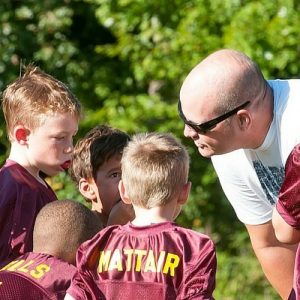
The only way to do this is to make their experience as positive as we can.
Coaches need to build players up.
They need to reinforce what their players are doing well and they need to teach the areas where they are struggling.
Yelling at a player about what they are doing wrong is not making the player better.
Here’s a good rule for any coach…
“Be loud when you praise. Be quiet when you correct and teach.”
Your tone when you coach means everything to players.
Without good line coaching, we have big kids who aren’t getting a lot of attention in practice.
Then these kids make mistakes and get yelled at in games.
Do you think these kids want to keep playing?
I wouldn’t.
Neither would you.
Positive coaching is important for all kids in all youth sports.
This change can have the biggest impact on the success of a program.
We need positive coaches who are positive role models making a positive impact on kids.
I hope your found some value learning how to improve offensive line play.
If you did please like, comment and share.
Also, if you have questions about training your athlete or your coaches please contact us at steve@trenchtraining.com or glenn@trenchtraining.com.
Let’s Play,

Coach Steve
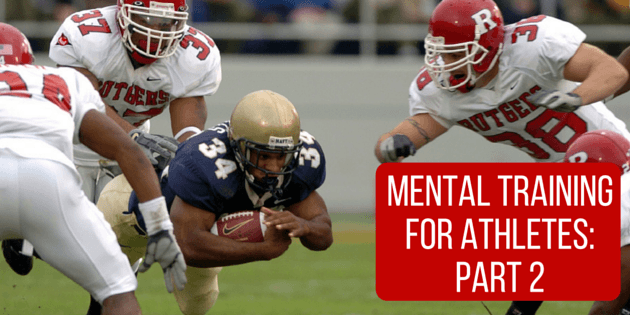
by Steve Stark | Apr 9, 2016 | Blog, training
The second part of Mental training is all about performance.
The information I am focusing on in this article is based on research by Dr. Jack Lesyk’s and his article on Sportpsych.org.
Dr. Jack Lesyk, Ph.D. Uses a performance chart that makes a lot of sense to me in how you become a high performing athlete.
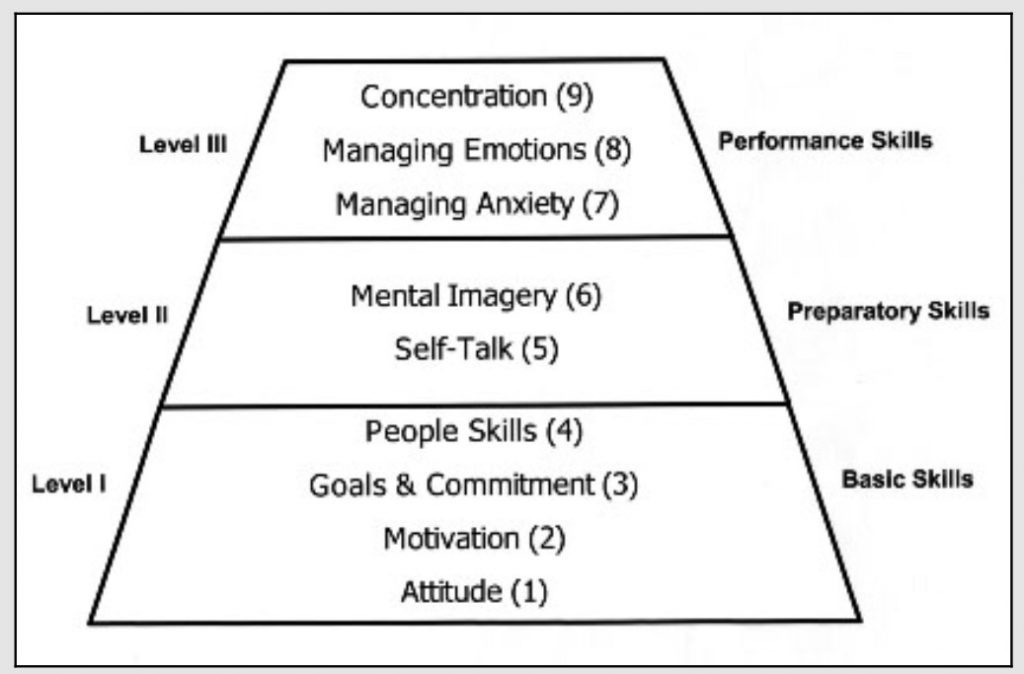
His pyramid describes the levels that an athlete must move through to become a high functioning athlete.
I agree that there are short and long term phases in athletics.
Many of the athletes struggle with their talent because their emotions are not able to handle the competition.
It has nothing to do with their skill or talent but all to do with handling their emotions. This is level 3.
Mental Training for Athletes: The Performance Pyramid
Although each of the nine skills is important, its primary importance will occur during one of three phases: long-term development, immediate preparation for performance, and during performance itself.
Level I
These mental skills constitute a broad base for attaining long-term goals, learning, and sustaining daily practice.
They are needed on a day-by-day basis for long periods of time, often months and years.
Level II
These skills are used immediately before performance to prepare for performance.
They maybe used just before competition begins, or immediately before a specific performance action, such as a golf shot or a free throw in basketball.
Level III
These skills are used during actual performance behavior.
Spending time on These 9 Mental skills will help you attain the level III in athletics.
Detailed Descriptions of the Nine Mental Skills
1. Attitude
Successful athletes:
- Realize that attitude is a choice.
- Choose an attitude that is predominately positive.
- View their sport as an opportunity to compete against themselves and learn from their successes and failures.
- Pursue excellence, not perfection, and realize that they, as well as their coaches, teammates, officials, and others are not perfect.
- Maintain balance and perspective between their sport and the rest of their lives.
- Respect their sport, other participants, coaches, officials, and themselves.
Choice is the key word . Many athletes don’t realize that they can choose how they think. This is something that everyone can do! Viewing life as an opportunity as opposed to a right. We are not owed anything. When we realize this it makes a huge difference in our level of anxiety and stress. The less stressed and anxious we are the better we perform! Respecting the game, the coaches, other players, and yes, the parents that haul you around and buy your gear, is so important in helping you move towards your goals of being great!!
2. Motivation
Successful athletes:
- Are aware of the rewards and benefits that they expect to experience through their sports participation.
- Are able to persist through difficult tasks and difficult times, even when these rewards and benefits are not immediately forthcoming.
- Realize that many of the benefits come from their participation, not the outcome.
Consequences and rewards are a great motivational tool to use on yourself. Coaches and parents will use their own methods of rewards and consequences but it is important for you to come up with your own appropriate consequences and rewards system.
3. Goals and Commitment
Successful athletes:
- Set long-term and short-term goals that are realistic, measurable, and time-oriented.
- Are aware of their current performance levels and are able to develop specific, detailed plans for attaining their goals.
- Are highly committed to their goals and to carrying out the daily demands of their training programs.
I talked in depth about this in the previous article. Goals are very important and paying attention to progress is a big part of this.
4. People Skills
Successful athletes:
- Realize that they are part of a larger system that includes their families, friends, teammates, coaches, and others.
- When appropriate, communicate their thoughts, feelings, and needs to these people and listen to them as well.
- Have learned effective skills for dealing with conflict, difficult opponents, and other people when they are negative or oppositional.
Sometimes athletes are not real social. This does not mean that they do not have people skills. They may have very good skills but choose to use them sparingly. There is nothing wrong with this type of athlete and I have seen many who go on to play at a high level. The key is for them to understand what is going on around them. They can’t allow others to affect their emotions. Learning to deal with conflict, loss and adversity is key to helping an athlete perform at his or her best.
5. Self-Talk
Successful athletes:
- Maintain their self-confidence during difficult times with realistic, positive self-talk.
- Talk to themselves the way they would talk to their own best friend
- Use self-talk to regulate thoughts, feelings and behaviors during competition.
Another skill that I mentioned in previous article that I feel is very important as well.
6. Mental Imagery
Successful athletes:
- Prepare themselves for competition by imagining themselves performing well in competition.
- Create and use mental images that are detailed, specific, and realistic.
- Use imagery during competition to prepare for action and recover from errors and poor performances.
7. Dealing Effectively with Anxiety
Successful athletes:
- Accept anxiety as part of sport.
- Realize that some degree of anxiety can help them perform well.
- Know how to reduce anxiety when it becomes too strong, without losing their intensity.
I think this is one of the most important skills and it is overlooked by many coaches, parents and athletes. Fear is another name for anxiety. Fear can cripple an athlete. It can keep an athlete from being able to perform or even function. This skill is VERY Important to look at because there is so much to learn about what and where fear comes from. Fear also is something that you can choose to overcome by working on it. I would suggest, to any young athlete, that they spend a lot of time learning what fear really is and how to overcome it.
8. Dealing Effectively with Emotions
Successful athletes:
- Accept strong emotions such as excitement, anger, and disappointment as part of the sport experience.
- Are able to use these emotions to improve, rather than interfere with high level performance
This is often a misunderstood skill and also one that does not typically get talked about by coaches and athletes. I believe emotions are not talked about because many athletes have fear that it will make them look weak. The truth is that this skill will make them strong beyond their understanding.
9. Concentration
Successful athletes:
- Know what they must pay attention to during each game or sport situation.
- Have learned how to maintain focus and resist distractions, whether they come from the environment or from within themselves.
- Are able to regain their focus when concentration is lost during competition.
- Have learned how to play in the “here-and-now”, without regard to either past or anticipated future events.
Please feel free to message us if you have questions or require more information about any of our post topics.
We want to help you and your athlete become better at both the physical and mental aspects of sport.
At Trench Training we also have sports life coaches available for you to work with if you are looking for some extra help.
Play Big!

Coach Glenn







